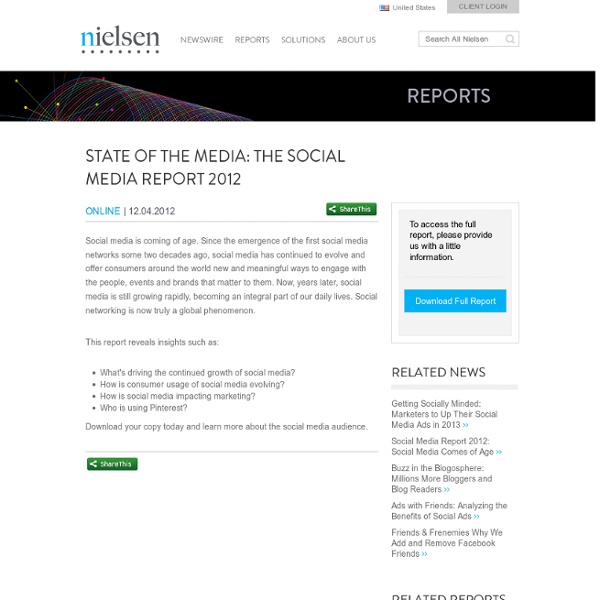World Internet population has doubled in the last 5 years
Posted in Tech blog on April 19th, 2012 by Pingdom This year the number of Internet users worldwide reached 2.27 billion, almost exactly twice what it was in 5 years ago, 1.15 billion. We all know the Internet is big, but this kind of growth really puts things into perspective. The Internet population has been swelling rapidly since the arrival of the World Wide Web (which rests firmly on top of the foundation provided by the Internet). It’s human nature to get used to changes, so most of us have a tendency to forget how rapidly the world has changed, and keeps changing.
Geert Lovink - Networks Without a Cause: A Critique of Social Media
Description With the vast majority of Facebook users caught in a frenzy of ‘friending’, ‘liking’ and ‘commenting’, at what point do we pause to grasp the consequences of our info-saturated lives? What compels us to engage so diligently with social networking systems? Networks Without a Cause examines our collective obsession with identity and self-management coupled with the fragmentation and information overload endemic to contemporary online culture. With a dearth of theory on the social and cultural ramifications of hugely popular online services, Lovink provides a path-breaking critical analysis of our over-hyped, networked world with case studies on search engines, online video, blogging, digital radio, media activism and the Wikileaks saga.
Digital Paper Could Become Like 'Google Docs for Artists'
Computer engineers have turned ordinary paper into a display with a UV lighting technique, which could one day help artists work on real-time collaborations from opposite sides of the world. Researchers from the Naemura Group at the University of Tokyo call the method “paper computing technology”. Ordinary paper is coated with a photochromic material, which changes color when light is shone on it.
Social media trends to watch for 2011
Just like you, I get hordes of messaging on social media. And this is in addition to all the other work you might be doing in the area -- conferences, summits, your own personal social media activities. The list goes on.
5 Reasons Not to Ban Social Networking in Schools
With an understandable concern about preventing cyber-bullying some schools and local authorities take the nuclear option when it comes to social networking and ban those sites wholesale. I’m tweeting to the choir here – but here are 5 reasons why social networking sites, whether they be open or closed, have a valid and important contribution to make to teaching. 1) Banning Social Networking At School Won’t Stop Cyber-Bullying If anything it will move it from an environment which you at least some control and visibility to one where you have none whatsoever.
World Usage Patterns & Demographics - New Media Trend Watch World
Demographics There were an estimated 2,405,510,175 internet users worldwide for mid-year 2012 (June 30, 2012), according to Internet World Stats. This represented about 34.3% of the population worldwide and a 566.4% growth compared to 2000. Internet users worldwide by regions, mid-year 2012 (June 30, 2012): WORLDWIDE: 2,405,510,175 - Asia: 1,076,681,059 (44.8% of internet users worldwide) - Europe: 518,512,109 (21.5%) - North America: 273,785,413 (11.4%) - Latin America / Caribbean: 254,915,884 (10.6%) - Africa: 167,335,676 (7.0%) - Middle East: 90,000,455 (3.7%) - Oceania / Australia: 24,279,579 (1.0%) ( Internet World Stats , October 2012) There were 2.4 billion internet users (2,405,510,175) worldwide in the first quarter of 2012, according to Internet World Stats data updated June 30, 2012.
Why the Social Media Revolution Is About to Get a Little Less Awesome - Derek Thompson
Social media is about to get much more annoying, and it's all Facebook's fault (kinda.) Reuters In the wake of Facebook's disappointing IPO, Paul Graham, the cofounder of the country's most famous and successful tech incubator, Y Combinator, sent an email to his portfolio companies predicting a shift in the way venture capitalists evaluated start-up potential. Before the public offering, companies that build a large audience were not under much pressure to build a revenue model to match. But "the bad performance of the Facebook IPO will hurt the funding market for earlier stage startups," he wrote, "possibly a lot, if it becomes a vicious circle."
Graphene-made e-paper by 2015 and anticancer drugs by 2030
Ultra-strong and self-healing copycat material graphene has been the subject of intense excitement since Andre Geim and Konstantin Novoselo extracted it from bulk graphite in 2004, earning them the Nobel Prize in Physics in 2010. Now, an international team of physicists led by Novoselo has published a paper laying out a timeline of future uses for the incredibly versatile material, which includes its role in anticancer drugs and rollable e-paper. "A roadmap for graphene", published in the journal Nature, proves that the one atom-thin super-conductive material has plenty of future uses outside of electronics, though it will be an integral part of the imminent future development of devices. That's because the type of graphene needed for things like touchscreens is of a lower, more easily manufactured quality. "Different applications require different grades of graphene and those which use the lowest grade will be the first to appear, probably as soon as in a few years," said Novoselov.
100 Personal Branding Tactics Using Social Media
You are not special. You are not a beautiful or unique snowflake. You are the same decaying organic matter as everything else. – Tyler Durden, Fight Club.



